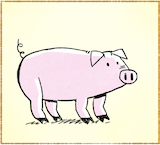
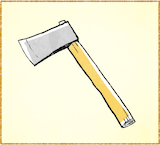
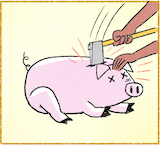
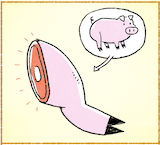
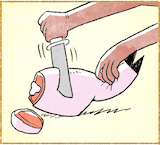

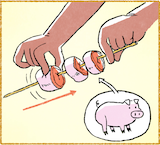
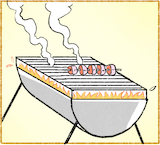
นี้คืออี่หยัง นี้คือหมู
หมูมันโตสีหญัง หมูมันโตสีซมพู
หมูมันโตใหญ่บ่ โตใหญ่อยู่ แต่ว่าโตบ่ใหญ่หลาย โตใหญ่พอสมควน
หมูมันมีหางบ่ มีอยู่ หมูมันมีหาง
หมูมันมีหางจักอัน หมูมีหางอันเดียว
หมูมีหูบ่ มีอยู่ หมูมันมีหูสองข้าง
หมูมีตาบ่ มีอยู่ หมูมันมีตาสองข้าง
หมูมันมีดังบ่ มีอยู่ หมูมันมีดัง
ดังหมูอันใหญ่บ่ ใหญ่อยู่ ดังหมูมันอันใหญ่ ดังหมูมันอันใหญ่หลาย
หมูมันมีขาบ่ มีอยู่ หมูมันมีขา หมูมันมีสี่ขา
หมูมันตาฮักบ่ บ่ หมูมันโตใหญ่ หมูมันบ่ตาฮัก หมูมันเหม็นพ้อม
9
นี้คืออี่หยัง นี้คือขวน
ขวนมันเป็นแบบใด ขวนมันค้ายๆ มีด แต่ว่าขวนมันสิเปกว่ามีด* ขวนมันสิสั้นกว่ามีด
ขวนมันอันใหญ่บ่ อันใหญ่อยู่ อันใหญ่พอสมควน
ขวนมันคมบ่ คมอยู่ ขวนมันคมหลาย เอาไว้ฟันอี่หยังกะได้ เอาไว้ปาดอี่หยังกะได้
ขวนเฮ็ดมาจากอี่หยัง ขวนเฮ็ดมาจากเหล็ก
ขวนสีอี่หยัง ขวนสีขาว
ขวนมันมีด้ามบ่ มีอยู่ ขวนมันมีด้าม
ด้ามขวนมันญาวบ่ ด้ามขวนมันญาวอยู่
ด้ามขวนเฮ็ดมาจากอี่หยัง ด้ามขวนเฮ็ดมาจากไม้ ด้ามขวนเฮ็ดมาจากเหล็กกะได้
ด้ามขวนสีอี่หยัง ด้ามขวนสีเหลียง
*มีดเปกว่าขวน
10
เขากำลังสิเฮ็ดหญัง เขากำลังสิข้าหมู
เขาใซ้อี่หยังข้าหมู เขาเอาขวนข้าหมู
เขาข้าหมูจั่งใด เขาเอาขวนฟันลงไปเทิงหัวหมู
เขาข้าหมูจักโต เขาข้าหมูโตเดียว
หมูโตใหญ่บ่ โตใหญ่อยู่
เป็นหญังเขาคือข้ามัน เขาอาดสิเอาไปเฮ็ดแนวกิน หลือสิเอาหมูไปขายกะได้
หมูมันฮ้องบ่ หน้าจะฮ้อง เพาะว่าเขาใซ้ขวนฟันเทิงหัวของมัน
หมูมันสิเจ็บบ่ กะหน้าจะเจ็บ เพาะว่าเขาใซ้ขวนข้ามัน มันคือสิเจ็บ มันคือสิทอละมานหลาย เป็นตาลิโตนมันหลายๆ
เขาใซ้อี่หยังจับขวน เขาใซ้มือของเขาจับขวน
เขาใซ้มือข้างเดียวของเขาจับขวน มืออีกข้างหนึ่งของเขาจับอยู่เทิงหัวหมู
11
นี้คืออี่หยัง นี้คือขาหมู
ขาหมูมาแต่ใส ขาหมูมาแต่โตของหมู
ขาหมูกินได้บ่ กินได้อยู่
ขาหมูเอามาเฮ็ดหญัง อาดสิเอามาเฮ็ดแนวกิน หลือเฮ็ดอี่หยังกะได้
เนี้ยหมูสีอี่หยัง เนี้ยหมูสีแดง
หมูมีกะดูกบ่ มีอยู่ หมูมันมีกะดูก
กะดูกกินได้บ่ บ่ กะดูกกินบ่ได้ กะดูกมันแข็งหลาย คนกะเลยบ่กินกะดูก
คนกินเนี้ยหมูได้บ่ ได้อยู่ คนกินเนี้ยหมูได้
ขาหมูมันมีเล็บบ่ มีอยู่ ขาหมูมันมีเล็บ
เล็บหมูสีอี่หยัง เล็บหมูสีดำ
เล็บหมูแหลมบ่ แหลมอยู่ เล็บหมูแหลมหลาย
12
เขากำลังเฮ็ดหญัง เขากำลังปาดเนี้ยหมู
เขาใซ้หญังปาดเนี้ยหมู เขาใซ้มีดปาดเนี้ยหมู
มีดมันอันใหญ่บ่ อันใหญ่อยู่ แต่ว่าอันใหญ่บ่หลาย
มีดมันแหลมบ่ แหลม มีดมันแหลมบักคัก
เขาปาดเนี้ยหมูไปเฮ็ดหญัง บ่ลู้คือกันว่าเขาสิเอาเนี้ยหมูไปเฮ็ดหญัง เขาอาดสิเอาเนี้ยหมูไปเฮ็ดแนวกินกะได้
เขาปาดเนี้ยหมูแบบใด เขาปาดเนี้ยหมูเป็นซิ้นวงกม
เขาปาดขาหมูแฮงบ่ บ่ลู้คือกันว่าเขาปาดแฮงหลือปาดค่อย
13
นี้คืออี่หยัง นี้คือไม้
ไม้อี่หยัง ไม้แหลม
ไม้มันอันใหญ่บ่ บ่ ไม้มันอันบ่ใหญ่ ไม้มันอันน้อยๆ แต่ว่ามันแหลมบักคัก
ไม้อันนี้เอาไว้เฮ็ดหญัง เอาไว้เสียบของ เอาไว้เสียบอาหาน หลือเอาไว้เสียบอี่หยังกะได้
14
เขากำลังเฮ็ดหญัง เขากำลังเสียบเนี้ยหมู
เขาใซ้หญังเสียบเนี้ยหมู เขาใซ้ไม้แหลมๆ เสียบเข้าไปในเนี้ยหมู
เนี้ยหมูมีจักต่น เนี้ยหมูมีสามต่น
เนี้ยหมูต่นใหญ่บ่ บ่ เนี้ยหมูต่นบ่ใหญ่ เนี้ยหมูต่นน้อยๆ
เขาเสียบเนี้ยหมูจั่งใด เขาใซ้มือข้างหนึ่งของเขาจับไม้ แล้วมือข้างหนึ่งของเขากะฮูดเนี้ยหมูเข้าไปในไม้
15
นี้คืออี่หยัง เขากำลังย้างหมูเทิงเตาไฟ
เนี้ยหมูมีจักไม้ เนี้ยหมูมีไม้เดียว
ในไม้มีเนี้ยหมูจักต่น ในไม้มีเนี้ยหมูห้าต่น
หมูมันฮ้อนบ่ กะหน้าจะฮ้อน เพาะว่ามันย้างอยู่เทิงเตาไฟ
ไฟมันฮ้อนบ่ กะหน้าจะฮ้อน เพาะว่ามันเป็นไฟ
ตอนนี้ไฟมันลุกบ่ กะหน้าจะลุกอยู่
คือลู้ว่าไฟมันลุก กะลู้ เพาะว่าเห็นควนมันลอยอ่มๆ ขึ้นมาจากเตาไฟ
เป็นหญังเขาคือย้างเนี้ยหมู บ่ลู้คือกัน เขาอาดจะย้างเนี้ยหมูนี้ไปกินกะได้
Link to overview page
Link to dictionary
| Isaan | Pronunciation | Tones | Thai | English/Notes |
|---|---|---|---|---|
| นี้ | ni: | HF | นี้ | 1. this 2. here |
| คือ | khʉ: | HR | คือ | 1. to be, to resemble, like, as 2. why {บักหล้าคือบ่เก็บโต่ะแน่ = [addressing a young boy] Why haven't you cleared the table?} |
| อี่หยัง | i:-yaŋ | H-M | อะไร | 1. what {นี้คืออี่หยัง = What is this?} {มื้อนี้เจ้าเฮ็ดอี่หยัง = What are you doing today?} {กินเข้างายกับอี่หยัง = What did you have for breakfast?} 2. something, anything, (in negations) nothing {บ่ต้องเฮ็ดอี่หยังอีกเลยนอกจากใส่ปุย = [we] don't need to do anything besides adding fertilizer} |
| หมู | mu: | M | หมู | pig |
| มัน | man | HR | มัน | it (also used to refer to people) |
| โต | to: | M | ตัว | 1. body, self 2. clf. for animals, characters/letters/consonants, appliances, clothes (e.g., pairs of trousers, shirts) |
| สี | si: | M | สี | 1. color 2. colored pencil, crayon |
| หญัง | ɲaŋ | M | อะไร, เป็นหญัง = ทำไม | 1. what {เขากำลังเฮ็ดหญัง = What is he doing?} {ธูปเอาไว้เฮ็ดหญัง = What are incense sticks for?} 2. something, anything, (nothing) 3. เป็นหญัง[...]คือ in initial position: why {เป็นหญังเขาคือใส่บักพิกลงไปในกวยเตียว = Why is he putting chili in [his] noodle soup?} {เป็นหญังหน้าต่างมันคือเปิด = Why is the window open?} {เป็นหญังมันคือมีควนไฟ = Why is there smoke?} |
| ซมพู | som-phu: | HR-HR | ชมพู | pink |
| ใหญ่ | ɲai | H | ใหญ่ | large, big |
| บ่ | bɔ: | H | ไม่ | 1. no, not 2. question particle, transforming a statement into a question Notes: spelling exception in line with common usage on social media |
| อยู่ | yu: | H | อยู่ | 1. to be (located) at 2. yet, still 3. auxiliary indicating continuous or progressive action {ทอดปาอยู่ในกะทะ = (in the process of) frying a fish in the pan} {แม่กำลังเมี้ยนเฮียนอยู่ = mother is cleaning/tidying up the house} |
| แต่ว่า | tɛ:-wa: | H-H | แต่ว่า | 1. but 2. only {ฮู้แต่ว่าเขายืนอยู่พุเดียว = I only know that he's standing there by himself} |
| หลาย | la:i | M | เยอะ, มาก | many, much, very |
| พอสมควน | phɔ:-som-khu:an | HR-M-HR | พอสมควร | moderately, fairly, rather |
| มี | mi: | HR | มี | 1. to have 2. there is |
| หาง | ha:ŋ | M | หาง | tail |
| จัก | jak | M | จัก | 1. answer to a question: [I] don't know, don't know exactly, [I'm] not sure {พุซายคนนี้เขาเถ้าไป่ จัก จักเถ้าหลือบ่เถ้า เบิ่งบ่ค่อยออก = Is this man here already old? I don't know. I can't see clearly whether he's old or not.} {เขาเว้ากันอยู่ใส จักคือกัน = Where are they talking? I don't know either.} 2. exact(ly), what exactly {จักต้มอี่หยังกะบ่ฮู้ = I don't know what (exactly) he is cooking} {บ่ลู้คือกันจักปาอี่หยัง = I don't know either what kind of fish this is} 3. how much/many? {ต้นไม้มีจักต้น = How many trees are there?} {ตอนนี้จักโมงแล้ว = What time is it now?} {มือของเฮานี้สิมีจักนิ้ว = How many fingers do our hands have?} 4. a bit, a little bit {จักหน่อย/จักหน่อยหนึ่ง = a bit, a little bit} |
| อัน | an | M | อัน | 1. thing, object 2. general clf. for objects |
| เดียว | di:ao | M | เดียว | only, alone, single |
| หู | hu: | M | หู | 1. ear 2. opening, hole, e.g., the hole a needle has to insert the thread 3. handle which has a hole, e.g., of a cup or pot |
| สอง | sɔ:ŋ | M | สอง | two |
| ข้าง | kha:ŋ | LF | ข้าง | 1. side {มีหูจับสองข้าง = there are handles on both sides} 2. next to {วางอยู่ข้างๆ ก่องใบใหญ่ = it's placed next to the large box} {เขายืนอยู่ข้างๆ อีกพุหนึ่ง = he's standing next to another person} 3. clf. for body parts which come in pairs (eyes, ears, legs etc.) {เขามีตาสองข้าง = she has two eyes} |
| ตา | ta: | M | ตา | eye {เขามีตาสองข้าง = he's got two eyes} {หลับตา = to close one's eyes} |
| ดัง | daŋ | M | จมูก | nose |
| ขา | kha: | M | ขา | leg {ขาหน้า = front leg} {ขาหลัง = hind leg} {ส้งขาญาว = long trousers} |
| สี่ | si: | H | สี่ | four |
| ตาฮัก | ta:-hak | M-H | น่ารัก | cute, lovely |
| เหม็น | men | M | เหม็น | to smell, to stink |
| พ้อม | phɔ:m | HF | พร้อม | at the same time, also, too {มีตะเว็นพ้อม = the sun's out, too} {กะทะมีด้ามพ้อม = the pan has also a handle} |
| ขวน | khu:an | M | ขวาน | axe, hatchet |
| เป็น | pen | M | เป็น | 1. to be, to exist 2. to be able to 3. to suffer, sth. happens to 4. เป็นหญัง[...]คือ in initial position: why? {เป็นหญังเขากะคือแปงฟัน = Why is he brushing his teeth?} {เป็นหญังเคี่ยงบินมันคือสิตก = Why is the airplane falling down?} |
| แบบ | bɛ:p | LF | แบบ | 1. example, model, kind 2. style, form, pattern, design |
| ใด | dai | M | ใด | 1. which, that one which, what, how {เขานั่งแบบใด เขานั่งขดตะหมาดอยู่ = How is he sitting? He's sitting cross-legged.} {ตอนใด = when?} 2. whichever, whoever {หม้องใดหม้องหนึ่ง = some place, somewhere} {ขั้นเฮาอยากตื่นญามใด เฮากะตั้งเวลาปุกญามนั้น = If we want to get up at a certain time, we set the alarm to that time} Notes: sentence-final often with a marked rising tone |
| ค้าย | kha:i | HF | คล้าย | to resemble, to be similar, to be alike {ทัพพีเป็นค้ายๆ กับซ้อน = a ladle is similar to a spoon} |
| มีด | mi:t | HF | มีด | knife |
| สิ | si | M | จะ | future tense auxiliary {เขากำลังสิตื่น = he's about to wake up} {สิไปตะหลาด = [I'm] going to the market} |
| เป | pe: | M | แบน, เรียบ | flat {ปากเป็ดมันสิเป็นเปๆ = the beak of the duck is flat} |
| กว่า | gwa: | H | กว่า | more, more than, comparative: as, than |
| สั้น | san | LF | สั้น | short |
| คม | khom | HR | คม | 1. sharp {กันไกมันคม = the pair of scissors is sharp} {แข้วหมามันคม = dog's teeth are sharp} {ขวนมันคมบ่ = Is the axe sharp?} 2. blade, sharp edge of a knife etc. {เกี่ยวมีคมคือกันกับมีด = a scythe has a blade like a knife} |
| เอา | ao | M | เอา | to take, to give {เขากำลังเอาก่องไปซั่ง = he's taking the boxes to weigh them} {หมอกำลังเอายาให้คนป่วยกิน = the doctor is giving medicine to the patient} {เอาไว้ถ้า = is for, is used for, has the purpose of} |
| ไว้ | wai | HF | ไว้ | 1. to keep, to put, to place, to retain, to save, to reserve {เขาเอาหัวของเขาไว้ใส = Where does she put her head?} {หมาสิเลี้ยงไว้บ้าน = dogs are kept/raised in the house} {ไก่เลี้ยงไว้ในคอก = chicken are kept/raised in a coop} {หน้ามันบังไว้ = the face is covered/not visible} {เขาเอาโทละสับวางไว้หู = he holds the phone to his ear} 2. for {นาลิกาปุกมีไว้เฮ็ดหญัง = What is an alarm clock for?} {หม้อเอาไว้เฮ็ดแนวกิน = a pot is used to make food} {ก่องเอาไว้เฮ็ดหญัง ก่องเอาไว้ใส่ของ = What is the box for? It's for putting in stuff.} Notes: see also ไว้ถ้า |
| ฟัน | fan | HR | ฟัน | to cut, to hack, to chop |
| กะ | ga | M | ก็ | 1. then, consequently 2. also |
| ได้ | dai | HF | ได้ | 1. can 2. to get, to obtain 3. before verb: indicating past tense 4. บ่ได้ + verb: not |
| ปาด | pa:t | LF | หั่น, ผ่า | to cut, to slice |
| เฮ็ด | het | H | ทำ | to do, to make |
| มา | ma: | HR | มา | 1. to come 2. auxiliary expressing action towards the present or focal time {กะคุเฮ็ดมาจากอี่หยัง = What is the bucket made of?} {แล้วเขากะเก็บเงินจากพุนั้นมา = and then she takes the money of that person} |
| จาก | ja:k | LF | จาก | 1. from {... เฮ็ดมาจากอี่หยัง = ... is made from what?} 2. to depart |
| เหล็ก | lek | M | เหล็ก | iron, steel, metal |
| ขาว | kha:o | M | ขาว | white |
| ด้าม | da:m | HF | ด้าม | handle |
| ญาว | ɲa:o | HR | ยาว | long |
| ไม้ | mai | HF | ไม้ | wood, tree |
| เหลียง | li:aŋ | M | เหลือง | yellow |
| เขา | khao | M | เขา | personal pronoun: he, she |
| กำลัง | gam-laŋ | M-HR | กำลัง | auxiliary indicating continuous or progressive action |
| ข้า | kha: | LF | ฆ่า | to kill, to slaugther |
| ใซ้ | sai | HF | ใช้ | to use |
| จั่งใด | jaŋ-dai | H-M | ยังไง, แบบไหน | how, in what manner {บักนาวมันมีลดซาดจั่งใด = Lime fruits have what kind of taste?} {เขาปิดแอจั่งใด = How is he switching off the A/C?} {เทียนใซ้จั่งใด = How's a candle used?} {สิใซ้จั่งใด = how is [it] used?} |
| ลง | loŋ | HR | ลง | 1. to descend, to lower, to go down 2. down 3. bus/train etc.: to get off, to disembark {คนกำลังลงลดบั่ด = people are getting off the bus} 4. boat/ship etc.: to get on, to board {เขากำลังญ่างลงเลีย = he's boarding/getting on the boat} |
| ไป | pai | M | ไป | 1. to go 2. auxiliary indicating action extending into the future |
| เทิง | thə:ŋ | HR | บน | 1. on, on top of, at, in {เทิงโต่ะ = at/on the table} {กบมันนั่งอยู่เทิงใบบัว = the frog is sitting on the lotus leaf} {เทิงท้องฟ้า = in the sky} {มันแล่นอยู่เทิงลาง = [the train] runs on rails} {มีคนนั่งอยู่เทิงลดสามล้อสามคน = there are three people sitting in the tuk tuk} 2. up, upward Notes: pronunciation: also realized as ทัง |
| หัว | hu:a | M | หัว | 1. head 2. clf. for onions, bulbs of garlic |
| อาด | a:t | LF | อาจ | 1. might, may, will 2. likely |
| แนวกิน | nɛ:o-gin | HR-M | อาหาร | food {เฮ็ดแนวกิน = to prepare food} {ตำบักหุ่งเนี้ยกะสิเป็นแนวกิน = papaya salad is (a kind of) food} |
| หลือ | lʉ: | M | หรือ | or |
| ขาย | kha:i | M | ขาย | to sell |
| ฮ้อง | hɔ:ŋ | HF | ร้อง | 1. to cry (also short for ฮ้องไห้), to call 2. to shriek |
| หน้าจะ | na:-ja | LF-M | น่าจะ | is likely to |
| เพาะว่า | phɔ-wa: | H-H | เพราะว่า | because |
| ของ | khɔ:ŋ | M | ของ | of, belonging to |
| เจ็บ | jep | M | เจ็บ | painful, to hurt |
| ทอละมาน | thɔ-la-ma:n | HR-H-HR | ทรมาน | 1. to torture, to torment, to be cruel to 2. to suffer |
| ตาลิโตน | ta:-li-to:n | M-H-M | น่าสงสาร, น่าเห็นใจ | poor, pitiful |
| จับ | jap | M | จับ | 1. to grasp, to hold {เขาจับมือกัน = they're holding hands} {เขายืนจับไอติมอยู่ = she's standing, holding an ice cream} 2. to catch, to arrest {จับพุล้าย = to arrest a criminal} |
| มือ | mʉ: | HR | มือ | 1. hand 2. front leg/paw (e.g., of a cat) |
| อีก | i:k | LF | อีก | 1. more, again 2. other, another |
| หนึ่ง | nʉŋ | H | หนึ่ง | 1. one 2. after adjective: intensifier {บักคักหนึ่ง = very much} {อันบักใหญ่หนึ่ง = very large}, or attenuates the meaning {กะดาดมันแผ่นน้อยๆ หนึ่ง = the piece of paper is [relatively] small} |
| แต่ใส | tɛ:-sai | H-M | จากไหน | where from? |
| แต่ | tɛ: | H | จาก | 1. from {มาแต่โลงเลียน = [I'm] coming from the school} {เห็นเขาญ่างมาแต่ทางหลัง = seeing him coming from behind, see also: แต่ใส} 2. since, ago {แต่โดนเติบ = long ago} |
| กิน | gin | M | กิน | to eat, to consume, to use |
| เนี้ย | ni:a | HF | เนื้อ | meat Notes: pronunciation: also realized as เนื้อ |
| แดง | dɛ:ŋ | M | แดง | red |
| กะดูก | ga-du:k | M-LF | กระดูก | bone |
| แข็ง | khɛŋ | M | แข็ง | hard, strong |
| คน | khon | HR | คน | person, people |
| เลย | lə:i | HR | เลย | 1. futher on, beyond, past {เข็มน้อยเลยเลขสิบสองไป = the minute hand has passed number twelve} 2. too much 3. at all 4. definitively 5. completely, utterly |
| เล็บ | lep | H | เล็บ | nail, claw, hoof |
| ดำ | dam | M | ดำ | 1. black 2. to transplant rice seedlings {ดำนา = to transplant rice seedlings} |
| แหลม | lɛ:m | M | แหลม | sharp |
| บักคัก | bak-khak | M-H | intensifier: very, very much (variant of คัก) | |
| ลู้ | lu: | HF | รู้ | 1. to know 2. to understand Notes: equivalent to ฮู้ |
| คือกัน | khʉ:-gan | HR-M | เหมือนกัน | 1. also, likewise, similarly {ยินดีที่ได้ฮู้จักคือกันคับ = Nice to meet you too!} 2. in negative sentences: either {บ่ลู้คือกัน = I don't know either} {จักคือกัน = I don't know (either)} |
| ว่า | wa: | H | ว่า | 1. that, as {คำว่า X = the word X} 2. to say |
| ซิ้น | sin | HF | ชิ้น | 1. piece, slice 2. skin {หนีบซิ้น = to pinch the skin} |
| วงกม | woŋ-gom | HR-M | วงกลม | 1. circle, ring, sphere 2. round |
| แฮง | hɛ:ŋ | HR | แรง | 1. strong {ลมกำลังพัดแฮงอยู่ = to wind is blowing strongly} 2. loud {เสียงแฮง = loud} 3. strength, power |
| ค่อย | khɔ:i | H | ค่อย | 1. soft, gentle 2. little by little, gradually |
| น้อย | nɔ:i | HF | น้อย | 1. few, little 2. small |
| เสียบ | si:ap | LF | เสียบ | to insert, to put in {เสียบปั่ก = to plug in} {ใซ้ซ้อนส้อมเสียบลูกซิ้น = to pick up meat balls with a fork} |
| ของ | khɔ:ŋ | M | ของ | thing, object |
| อาหาน | a:-ha:n | M-M | อาหาร | food {ญุงมันกินเลียดเป็นอาหาน = the mosquito feeds on blood} |
| เข้า | khao | LF | เข้า | to enter, to go inside, to come/go in/on {เข้าห้องน้ำ = to go to the bathroom} {เข้านอน = to go to bed} {ขี่เลียเข้าไปเกาะ = to take a boat to go on an island} |
| ใน | nai | HR | ใน | in, within |
| ต่น | ton | H | ชิ้น | clf. for pieces of meat, fish etc. |
| สาม | sa:m | M | สาม | three |
| แล้ว | lɛ:o | HF | แล้ว | 1. finished 2. already 3. and then, and next (especially แล้วกะ) 4. auxiliary for past tense |
| ฮูด | hu:t | HF | รูด | to pull, to slip |
| ย้าง | ya:ŋ | HF | ย่าง | to roast, to grill Notes: alternative pronunciation ญ้าง (HF) |
| เตา | tao | M | เตา | stove, oven |
| ไฟ | fai | HR | ไฟ | 1. fire, flame 2. electricity, power 3. light |
| ห้า | ha: | LF | ห้า | five |
| ฮ้อน | hɔ:n | HF | ร้อน | hot |
| ตอนนี้ | tɔ:n-ni: | M-HF | ตอนนี้ | now |
| ลุก | luk | H | ลุก | 1. to be in flames, to burn 2. to rise, to get up, to stand up |
| เห็น | hen | M | เห็น | to see |
| ควน | khu:an | HR | ควัน | 1. smoke 2. steam |
| ลอย | lɔ:i | HR | ลอย | 1. to float, to swim 2. to soar 3. smoke/steam: to rise |
| อ่มๆ | om | H | gently, softly Notes: translation to be confirmed; see also อึ่มๆ, ฮึ่มๆ |
|
| ขึ้น | khʉn | LF | ขึ้น | 1. to go up, to increase 2. sun: to rise {ตะเว็นกำลังขึ้น = the sun is rising} 3. more 4. bus/train etc.: to get on, to board {พุโดยสานขึ้นลดไฟเบิดแล้ว = all passengers have boarded the train} |
| อาดจะ | a:t-ja | LF-M | อาจจะ | 1. may 2. might, maybe Notes: equivalent to อาดสิ |